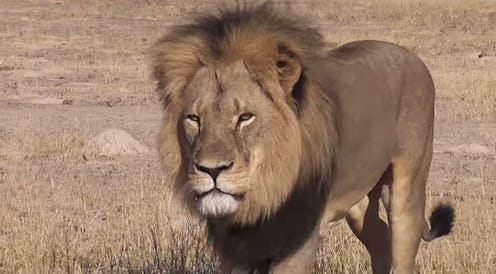News
Will Cecil The Lion's Killer Face Charges?

The death of Cecil the Lion has reverberated worldwide as people have expressed outrage at an American dentist who admittedly killed the beloved animal. But will Walter Palmer be charged for joining the hunt of the protected lion? Palmer, a Minnesota resident, could be held responsible for more than just pulling the trigger.
On Tuesday, Zimbabwe officials said Palmer faces poaching charges for his alleged role. A hunting guide and landowner is already set to appear in court Wednesday and could be sentenced to 15 years for allegedly helping lure Cecil outside of Hwange National Park, where the lion is believed to have initially been shot with a bow and arrow, tracked for 40 hours, and then finished off with a rifle. Cecil's body was found beheaded and skinned, and his GPS collar was destroyed. Zimbabwe's government has also accused Palmer of paying $55,000 to join the hunt. Palmer's whereabouts are currently unknown.
As Slate points out, U.S. federal law dictates that wounding or killing an endangered animal is illegal, per the Endangered Species Act, but Cecil's death would not count since the lion's status was "threatened." And because the acts didn't take place on U.S. soil, Palmer could not be held responsible for Cecil's death in American courts since it happened in Zimbabwe. However, Palmer could be charged for violating the Travel Act, which prohibits you from traveling overseas to participate in illegal activities such as bribery. According to Slate, if Palmer went to Zimbabwe with the intention to hunt an exotic species and bribed officials to make it happen, then he could be prosecuted for those crimes in the United States.
There's also the option of extradition. The United States and Zimbabwe share an extradition treaty that requires them to extradite accused offenders if their alleged crimes are illegal in both countries. If the Zimbabwean government requests extradition, the United States will oblige and likely without much resistance given the nature of Palmer's alleged crime. And if that happens, Palmer could face a tough trial given national outrage and strong fervor to protect the country's wildlife.
In a statement to released by Minnesota newspaper the Star Tribune, Palmer said he believed the hunt to be "legal and properly handled and conducted" and promised to cooperate with Zimbabwean and U.S. authorities.
I had no idea that the lion I took was a known, local favorite, was collared and part of a study until the end of the hunt. I relied on the expertise of my local professional guides to ensure a legal hunt. I deeply regret that my pursuit of an activity I love and practice responsibly and legally resulted in the taking of this lion.
And there in Palmer's statement lies what will be the key question should he be detained: whether or not he knew he was participating in an illegal hunt of a protected animal.
Image: Bryan Orford/YouTube; Getty Images (1)